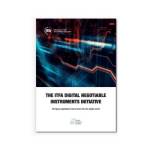Introduction to Digital Negotiable Instruments

Access trade, receivables and supply chain finance
We assist companies to access trade and receivables finance through our relationships with 270+ banks, funds and alternative finance houses.
Get StartedContents
An introduction to Digital Negotiable Instruments
In April 2020 the International Trade and Forfaiting Association (ITFA) released the first edition of this manual closely followed by a paper setting out the Digital Documents (dDOCs) standards which looked at how to practically implement the digitized instruments covered by the manual.
We are now publishing the second edition of the manual incorporating the dDOC specifications in one document to spread awareness of the valuable and implementable resources it contains.
In June, ITFA stated that:
“The need for more and better technology has never been clearer. The fragility of supply chains, small and medium enterprise (SME) finance, and world trade has never been more exposed. The World Trade Organization (WTO) estimates that 80 – 90% of world trade depends on trade finance, yet the best-known measure of the global funding gap developed by the Asian Development Bank of around $1.5 Trillion has persisted for a number of years (other measures put the gap much higher).”
Since then, what the United Nations is calling the “Great Disruption” has seen global gross domestic product (GDP) fall by 4.3%. The pandemic has, however, served to focus attention on the need to digitize world trade both to save costs and improve resilience. While much of the focus has been on physical manufacturing processes, leveraging new additive processes and the Internet of Things (IoT), the financial supply chain must also be digitized. This manual is a step in this direction.
Sections 2 and 3 set out how the technology works and what is required to replace paper originals with digital originals. Whilst it is recommended that the combined use of cryptography and distributed ledger technology (DLT) or blockchain, other types of technologies can be employed too. These sections have been written by André Casterman, Founder and MD, Casterman Advisory and head of the ITFA Fintech Committee.
Appendix 1 sets out an analysis of the law by our legal advisers, Sullivan, and a proposed solution to the issues discussed. We support this solution. ITFA continues to lobby for a change in the law in England and has had fruitful discussions with the Law Commission which is acting on a mandate from the UK Government. A copy of a letter received from the Ministry of Justice is attached in Appendix 3.
The solutions set out in Appendix 1 shows how to create functional equivalents of bills of exchange and promissory notes under the English Bills of Exchange Act 1882 (BoE 1882) in digital form. The foundation for such equivalents is explained in paragraph 9 of Appendix 1; the template wording for a digital equivalent of a promissory note is set out in Appendix 2 Part 1 and the wording for a bill of exchange in Appendix 2 Part 2. These equivalents are referred to in this paper as Electronic Payment Undertakings (ePUs). These constitute a type of Electronic Negotiable Instrument (eNI).
These functional equivalents will need to be used as, at least in the UK and despite the engagement of the UK government and the Law Commission, the legislative time needed to pass the change in law will not be available until 2022, in all likelihood.
It is worth reminding readers why it was chosen to investigate and solve the position under English law. This is simply because English law is one of the most widely used systems of law in international trade. Common law countries globally tend to have a system very similar to English law; around 40% of the world’s legal systems are based on or inspired by English law. Hence, the discussion in Appendix 1 and the solutions suggested will be of broad relevance and application. Further legal research is required to evaluate the acceptability of these digital equivalents in other jurisdictions.
- Digital Negotiable Instruments
- TFG Legal Hub















